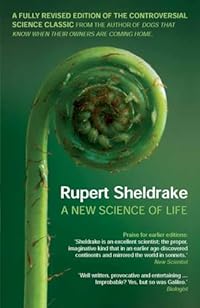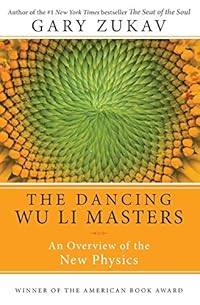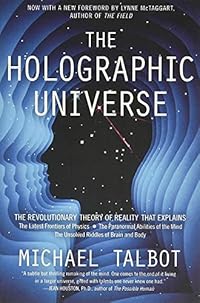What if nature has memory? What if the reason a protein folds in a particular way, a bird knows how to build its nest, or a crystal forms its characteristic shape isn't just because of genes or physical laws-but because it has happened before? This is the revolutionary proposal of biologist Rupert Sheldrake. His theory of morphic resonance suggests that patterns of organization are transmitted across time and space through fields that connect all members of a species, all instances of a form.

The Problem with Conventional Biology
Standard biology tells us that genes contain all the information needed to build an organism. But genes only code for proteins-they don't explain how those proteins organize into tissues, organs, and complex structures. A caterpillar and a butterfly have identical DNA, yet their forms are radically different. Genes alone cannot explain morphogenesis: the development of form.
Similarly, behavior patterns persist across generations in ways that genetics cannot fully explain. How do birds that have never seen a nest know how to build one? How do newborn sea turtles know to crawl toward the ocean? Conventional science attributes this to "instinct"-but what IS instinct? Sheldrake proposes that these patterns are transmitted through morphic fields.
What Are Morphic Fields?
Morphic fields are invisible organizing structures that shape the development and behavior of organisms. They contain a collective memory of the species, accumulated over time through morphic resonance. Each organism taps into these fields, accessing the patterns established by all previous members of its species.
How Morphic Resonance Works
Morphic resonance is the influence of like upon like across space and time. When a rat learns a new trick in one laboratory, rats everywhere should find it slightly easier to learn the same trick-even if they have no physical contact. When a crystal forms for the first time, it should be easier for that same type of crystal to form everywhere thereafter.
The key principles of morphic resonance:
- Memory in nature: The universe has inherent memory, not just mechanistic laws
- Cumulative influence: Each instance of a pattern makes future instances more likely
- Non-local connection: Morphic fields transcend space and time
- Self-reinforcing: The more a pattern is repeated, the stronger its field becomes
- Species-specific: Fields organize by similarity-human fields affect humans, oak fields affect oaks
Essential Morphic Resonance Books
Groundbreaking research from biologist Rupert Sheldrake

A New Science of Life
The original groundbreaking book introducing morphic resonance and formative causation.

The Presence of the Past
Deep dive into morphic resonance with extensive examples from nature and science.

Dogs That Know When Their Owners Are Coming Home
Accessible exploration of morphic fields in animals with fascinating real-world examples.
Evidence from Nature
The most compelling evidence for morphic resonance comes from unexpected sources. Consider the blue tit birds in Britain who learned to peck through milk bottle caps in the 1920s. Once a few birds discovered this trick, the behavior spread rapidly across the country-far faster than could be explained by birds observing each other. Even when milk delivery stopped during World War II, when it resumed, the behavior reappeared immediately, despite the fact that the original birds had died.
Or consider crystals: when a new synthetic compound is first crystallized, it often forms slowly and unpredictably. But after it has been crystallized multiple times around the world, subsequent attempts become easier everywhere-even in laboratories that have never handled the substance before. Conventional science attributes this to contamination or seed crystals, but Sheldrake proposes morphic resonance: the field of that crystal form becomes stronger each time it occurs.
- Behavioral transmission: Animals learning tasks show accelerated learning in subsequent generations
- Crystal formation: New compounds crystallize more easily worldwide after initial formation
- Telepathy in pets: Dogs and cats often know when owners are coming home, even at irregular times
- Phantom limbs: Amputees feeling missing limbs may tap into body morphic fields
- Collective learning: Solutions to problems spread through populations faster than communication allows
"The hypothesis of formative causation proposes that nature is not governed by eternal laws, but by habits. The habits of nature are inherited through morphic resonance." - Rupert Sheldrake, Biologist and Author
Beyond Morphic Resonance
Explore consciousness and the nature of reality

The Dancing Wu Li Masters
Quantum physics meets consciousness-perfect complement to morphic field theory.

The Conscious Universe
Scientific evidence for consciousness effects on reality through rigorous research.

The Holographic Universe
Revolutionary holographic model of reality that harmonizes with morphic resonance theory.
Implications for Human Consciousness
If morphic resonance is real, it transforms our understanding of who we are. We're not isolated individuals but participants in collective fields of memory and knowledge. When you learn something, you make it slightly easier for everyone else to learn it. When you have an insight, you contribute to humanity's morphic field, making that insight more accessible to others.
This has profound implications for education, innovation, and social change. Ideas whose time has come may literally become easier to think. Cultural movements may spread through morphic resonance as much as through communication. Even our thoughts and intentions may shape the morphic fields we participate in, influencing outcomes across space and time.
Practical Applications
Understanding morphic resonance can change how we approach learning, creativity, and problem-solving. By consciously participating in morphic fields-through meditation, intention, or focused practice-we may accelerate our own development while contributing to collective human evolution.
Implications for Evolution and Life
Morphic resonance suggests evolution is not purely random mutation and selection. Instead, organisms may tap into morphic fields containing solutions discovered by their ancestors. This explains rapid adaptation, convergent evolution, and the appearance of similar innovations in isolated populations.
- Accelerated learning: Each generation learns faster by accessing collective species memory
- Non-local influence: Breakthroughs in one location affect the entire species field
- Inherited wisdom: Instincts are morphic fields, not just genetic programs
- Collective consciousness: Human culture and knowledge exist in shared morphic fields
- Evolutionary memory: Nature remembers what has worked before, guiding future development
A Living, Learning Universe
Morphic resonance paints a picture of a universe fundamentally different from the mechanistic, clockwork cosmos of classical physics. It's a universe with memory, creativity, and the capacity to learn. The past influences the present not just through chains of physical causation, but through invisible fields of information and pattern that transcend space and time.
Whether or not morphic resonance is ultimately validated by science, it invites us to see nature as alive, creative, and interconnected in ways we're only beginning to understand. We are not separate from nature's memory-we are active participants in it, shaping the morphic fields that will guide future generations.